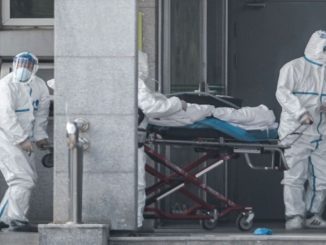
Tough global responses are building following in the aftermath of moves made by Russian President Vladimir Putin against Ukraine. European nations and the United States are preparing to impose sanctions, and Germany is halting a key gas pipeline, while Ukraine braces for fighting. Despite international backlash and condemnation, Putin remains defiant.
Putin last night recognized two breakaway territories in eastern Ukraine as an independent. Eastern Ukraine republics Donetsk and Luhansk lie right along the border with Russia.
Since 2014, Russian-backed separatists have pushed against Ukraine, in a conflict that has left 14,000 dead. Today, European officials said that Russia sent troops to these areas, which Putin called “peacekeepers,” but the Western world has said are military troops.
Sanctions are being drawn up by the United States and across Europe. President Joe Biden ordered swift financial sanctions against the two regions, saying an executive order was imminent to prohibit investment, trade, and financing by anyone in the U.S. to, from, or in the two regions.
The White House said that the U.S. will also soon announce additional measures related to the blatant violation of Russia’s international commitments. These sanctions are not the same ones that the U.S. has threatened for weeks to cripple Russia’s banking sector and target Putin and his close allies, which will come if Russia actually launches an invasion.
The United Kingdom and the European Union are drawing up their own sanctions. UK Prime Minister Boris Johnson announced a “barrage” of measures against Russia, including sanctioning five Russian banks and three individuals. He said it was inevitable that there will be a bigger package of sanctions as the situation escalates.
The EU announced its own sanctions proposal of targeted sanctions, stating that there are additional measures prepared if Putin proceeds with further military steps. Currently, the sanctions target anyone involved in the decision to recognize the two breakaway regions and send troops there, including 351 members of Russia’s parliament, who backed the recognition, along with the 11 people who proposed it. Banks are also targeted that finance Russia’s military and other operations.
EU sanctions also target the ability of the Russian state and government to access the EU’s capital and financial markets, and the financing of aggressive state policies, as well as trade from the regions to and from the EU. All member states will have to agree on the sanctions in order for them to be passed.
Germany announced it will be halting its Nord Stream 2 gas pipeline from Russia. Chancellor Olaf Scholz explained that Putin sending troops into eastern Ukraine has “fundamentally changed” the situation.
The United States and European leaders have widely condemned Putin. At the United Nations Security Council, members participating in an emergency meeting over Russia’s actions emphatically urged peace and diplomacy. Representatives from the U.S., UK, France, Germany, India, Ireland, UAE, Kenya, and Ghana all pleaded for war with Ukraine to be avoided, and for diplomacy to take the lead.
In Ukraine, President Volodymyr Zelensky urged his country to “keep a cool head” in the crisis.” But he also insisted that Ukraine would not hand over its territory to Putin, and the Defense Minister Oleksiy Reznikov seems to be preparing his troops for battle, telling his troops in a somber message that the time ahead will be difficult, and that there will be losses.
There has not yet been a major military escalation from the Ukraine side in the east of the country. But civilians are afraid of what’s coming, with reports that Ukrainians are boarding buses to escape separatist areas in fear of military fighting.




Be the first to comment